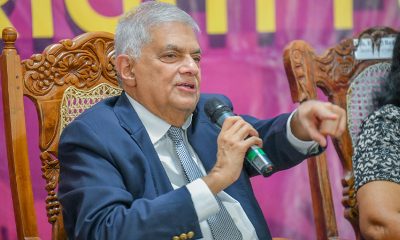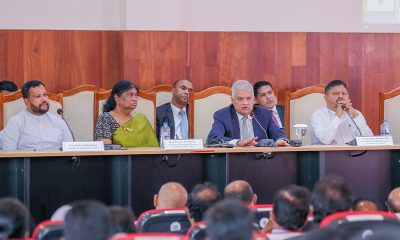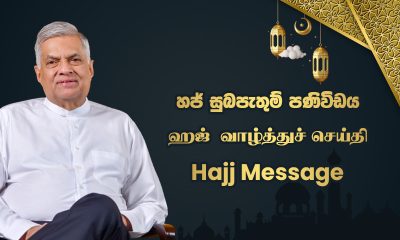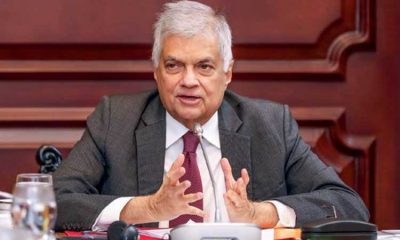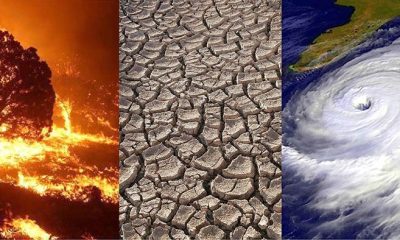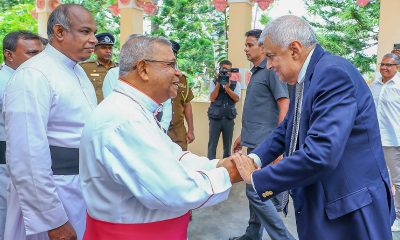Editorial
Parliament and the Cricket Board

We publish today a letter from an exultant reader, who is a frequent contributor to these columns, cheering the unanimity achieved in parliament on Thursday on doing something tangible about setting right the affairs of Sri Lanka Cricket (SLC). We need not labour the fact that all Lankans, be they cricket fans or not, have long been aware that SLC has been a corrupt institution awash with money for a very long time.
Despite sporadic efforts to set it right, including the appointment of numerous Interim Committees to run the body handled by officials elected by various clubs, some allegedly not involved in the game, very little has been achieved. This was eloquently displayed by the sorry performance of our national team now in India.
It was stridently proclaimed in parliament that “all 225″ must vote for the resolution moved by Opposition Leader Sajith Premadasa and seconded by Minister Nimal Siripala de Silva. The resolution was carried by acclamation and declared passed by the speaker. There was grumbling ex post facto that there was no division, something the speaker deemed unnecessary in view the stated support of all sides for the motion before the House. The resolution was titled ” Removal of corrupt officials, including the chairman of the Sri Lanka Cricket Board.” The mere fact that the House, in a rare show of unanimity, adopted the resolution does not mean that the corrupt officials of the Board, “including the chairman,” are going to vanish into thin air.
Sports Minister Roshan Ranasinghe who gazetted a new interim administration for SLC earlier last week, received warm plaudits from both sides of the House for what was generally considered his courageous action in taking on the Cricket Board which is believed to have many powerful backers . He used a rhetorical flourish, apparently aimed at President Ranil Wickremesinghe, the name of whose chief-of-staff, Sagala Ratnayake also figured in the debate, by declaring that choice was between “Betting Shammi and Roshan Ranasinghe.” We don’t know anything about the real or alleged betting antecedents of Mr. Shammi Silva now serving his third elected term as chief of SLC. As far as we recall, that did not appear to have figured in the full day debate in the legislature.
As the whole country is aware, the very day after the sports minister gazetted the new interim administration, SLC and it chairman obtained a writ order preventing the enforcement of the gazette appointing the interim committee to run the Cricket Board. This order is applicable for 14 days. By the time the court order was made on an action of which neither the sports minister nor his ministry were aware, World Cup winning captain, Arjuna Ranatunga, the new chairman of the interim body had visited SLC headquarters to assume control. He left no sooner the latest developments had been conveyed to him. There was no word of what Ranatunga did during his brief sojourn at SLC.
The parliamentary debate on which no less than about 30 MPs, including various ministers of sports who had served in past participated, elicited some very interesting information the public would have been aware of at the time the incidents occurred but would have long since forgotten. This included the fact that three families, the Ranatungas, the Sumathipalas and the Dharmadasas (of Nawaloka fame) have long wielded great influence over the affairs of Sri Lanka cricket.
Now Arjuna Ranatunga is back in the saddle – or will be if the court order already made is not reversed. But his choice has not been unanimously acclaimed. Though he is the World Cup winning captain, he is a scion of the Ranatunga political clan who has been in active politics. Mr. Upali Dharmadasa is also among the appointees.
The seven member interim body named by the minister includes two retired supreme court judges, a retired high court judge and two politically connected persons – Rakhitha Rajapakshe, a lawyer who is the justice minister’s son is one of them. The other, Hisham Jamaldeen, is a Colombo businessman whose father, AJM Muzammil has been the Mayor of Colombo, high commissioner to Malaysia, a member of the Western Provincial Council and governor of three provinces. Thus it will not be possible to claim that the new body names by the sports minister is apolitical.
The sports minister intervened when the JVP’s Vijitha Herath criticized Ranatunga’s appointment saying he had consulted leading cricketing personalities, including Sidath Wettimuni. The question that must arise, if the common perception that politics had done great harm to national cricket, why are politically connected people continuing to be appointed into reform bodies.
Thursday’s parliamentary debate saw an unusual attack by the sports minister on the President of the Appeal Court who issued the order staying the implementation of the minister’s gazette for 14 days. He not only named names but displayed pictures. The justice minister has regretted these allusions but they can’t be wished away. Opposition Whip, Lakshman Kiriella, also a lawyer, told the minister that he must intervene in the ongoing case. But the sports minister is on record saying the attorney general has been unhelpful.
What will happen when the case resumes remains to be seen. Parliamentary proceedings are absolutely privileged and no MP can be faulted for what he says in the legislature. The publication of such statements are also covered by privilege. In that context, will the particular judge who figured in the matter recuse himself from further participation? That remains an open question but a lot of serious matters must follow.
Editorial
The Customs and revenue bubble

Tuesday 30th December, 2025
Sri Lanka Customs is on cloud nine, boasting that it has set a revenue record. It says it has raised more than Rs. 2,497 million, which is in excess of the targets set by the government for the current year. An increase in state revenue is certainly a very positive development, but how that goal has been achieved should be revealed to the public.
There have been exponential tax increases and they have enabled the government to boost its revenue significantly. The Customs Department has been able to meet its revenue targets thanks to the lifting of restrictions on vehicle imports after a lapse of several years and tax hikes. The Customs has admitted that taxes on imported vehicles have amounted to about Rs. 870 billion in 2025. Thus, one can argue that vehicle imports have created a revenue bubble, which may not last long. An increase in the Customs’ revenue has come at the expense of the rupee, which is depreciating. So, there is no cause for celebration, and the government has to tread cautiously.
Spokesman for the Customs Chandana Punchihewa, addressing the media yesterday, blamed cargo clearance delays on a container backlog created by Cyclone Ditwah. Extreme weather events no doubt cause delays in ports, but in this country port delays occur even during long spells of fine weather. Protracted delays in the Colombo Port, in January 2025, led to the release of 323 red-flagged containers without Customs inspection. What they carried is anybody’s guess.
Excuses are of no use where port delays are concerned. Delays ruin ports, for they drive away major shipping lines. It has been reported that several international shipping lines have opted to bypass the Colombo Port, which is facing escalating congestion due to various factors related mainly to capacity and efficiency—not adverse weather as such. The Customs cannot absolve itself of responsibility for this sorry state of affairs in the Colombo Port, which has also been facing strategic neglect.
As we argued in a previous comment on port congestion, the Ports Authority, the government and the Customs must formulate a strategy to eliminate delays. If the Customs cannot cope with the situation, the Coast Guard personnel can be called in to help clear cargo; they are qualified to handle such tasks. The government ought to take cognisance of formidable challenges Sri Lanka faces from the other ports in the region, especially India’s newly built Vizhinjam port, which is becoming a major attraction for international shippers who are averse to delays. In global logistics, shipping lines place very high value on on-time delivery, reliability and efficient operations.
The government must make a serious effort to enhance the efficiency and capacity of the Colombo Port to retain the transshipment traffic historically routed via Colombo. There is a strong possibility of shipping lines rerouting feeder services away from Colombo to Vizhinjam, adversely impacting Colombo’s network role, as we have said previously, quoting shipping experts.
Vizhinjam has several key advantages over Colombo. It advertises itself as a deep-water port with a 24 m natural draft, which enables it to accommodate ultra-large container vessels without dredging; its proximity to the main east–west shipping route helps vessels to call without significant deviation, reducing voyage time and costs. Automation, modern cranes, faster turnaround times, enhanced operational efficiency and attractiveness to shipping lines are other advantages India’s new port has over Colombo.
Sri Lanka Customs may brag about its ‘revenue record’, but it must not lose sight of the need to enhance its productivity in view of challenges from other ports in the region to Colombo. It should reveal how it is going to meet the revenue targets set by the government when vehicle imports decrease, causing the current revenue bubble to burst.
Editorial
Jekylls and Hydes

Monday 29th December, 2025
Sri Lankan politicians love the media dearly and take up the cudgels for the rights of journalists when they are out of power. The JVP/NPP leaders also defended the media to the hilt while they were languishing in the Opposition. Jekylls become Hydes after being ensconced in power, with the media exposing their failures and malpractices. Those who can, do; those who cannot, attack the media, one may say of the governments in this country, with apologies to Bernard Shaw.
The JVP-led NPP government, angered by bad press, is all out to intimidate the media it cannot control. Previous governments had the police on a string and used them to attack and harass independent journalists. The incumbent administration has gone a step further; the police have reportedly written to the Telecommunications Regulatory Commission (TRC), asking for action against Hiru TV for what they describe as broadcasting unverified, misleading news. Thus, the government has used the police to give Hiru a choice between toeing the official line and losing its licence. Thankfully, its efforts have run into stiff resistance, with media institutions and various associations circling the wagons around Hiru.
If the government thinks Hiru or any other media institution disseminates false information to the detriment of its interests, legal avenues are available for it to seek redress. The police must not be used as a political tool to intimidate the media.
Among the current defenders of the media are the SLPP, the UNP, the SLFP, etc. Their leaders are shedding copious tears for Hiru. But it was while the UNP and SLPP leaders were in power that the suppression of media freedom and violence against journalists became institutionalised for all intents and purposes. UNP governments not only throttled media freedom but also murdered journalists. SLFP regimes had media institutions attacked and journalists killed. An SLFP-led government, with the current SLPP leaders at the helm, had media institutions torched and journalists abducted, assaulted and murdered. These sinners currently in the political wilderness are condemning other sinners in power for suppressing media freedom.
The government deserves the bad press it gets. The police have been reduced to a mere appendage of the JVP/NPP. Two of the NPP’s Retired Police Collective members, namely former Senior DIG Ravi Seneviratne and former SSP Shani Abeysekera, have been appointed Secretary to the Public Security Ministry and CID Director, respectively. Absurd claims the police make in defence of the government remind us of Matilda, whose dreadful lies made one gasp and stretch one’s eyes.
When the police were asked why NPP MP Asoka Ranwala had not been subjected to a breathalyser test immediately after a recent road accident he caused, they had the chutzpah to claim they had run out of test kits. They transferred two of their officers over the incident to enable the government to save face. They arrested one of their own men assaulted by an NPP MP following a recent police raid on a cannabis cultivation in Suriyakanda. Acting just like legendary King Kekille, they let the MP off the hook and arrested the policeman, who was bailed out; they went on to suspend him from service. A few months ago, they unashamedly sided with a group of JVP cadres who stormed a Frontline Socialist Party office in Yakkala and forcibly occupied it. They go out of their way to ensure that the arrests of drug dealers with links to the Opposition get maximum possible publicity, but they do their best to keep the media in the dark when narcotics dealers with ruling party connections are taken into custody. They crack down on Opposition politicians and activists but steer clear of government members and their supporters. The despicable manner in which they are doing political work for the government reminds us of the Gestapo. Now, they are zeroing in on Hiru TV at the behest of their political masters for exposing their sordid actions.
The only way the NPP government can overcome problems and challenges on the political front and shore up its crumbling image is to mend its ways and fulfil its election pledges while taking action against its errant members who have brought it into disrepute and turned public opinion against it. Shooting the messenger is not the way to set about the task.
Editorial
Executive brinkmanship

Pressure is mounting on President Anura Kumara Dissanayake to ensure that an Auditor General is appointed without further delay. But he has remained unmoved. He is determined to wear down the Constitutional Council (CC) and appoint one of his party loyalists as Auditor General. The CC has rejected his nominees—and rightly so; they are not eligible. Former Executive Presidents went all out to railroad the CC into rubber-stamping their decisions. They had no qualms about doing so while claiming to uphold the independence of the public service. President Dissanayake has failed to be different. His refusal to compromise amounts to brinkmanship; he is waiting until the CC blinks.
The NPP’s election manifesto, A Thriving Nation: A Beautiful Life, attributes the deterioration of the public service to ‘political appointments’ and state workers making political decisions. Among the steps the NPP has promised to take to straighten up the public service are ‘merit-based appointments and promotions’. This principle has fallen by the wayside where the question of appointing the Auditor General is concerned.
The government should take cognisance of the possible negative effects of the prolonged delay in appointing the Auditor General during a period of disaster response and international relief and rebuilding support.
The Bar Association of Sri Lanka has called upon President Dissanayake to appoint a person with proven competence, integrity, and independence, who commands wide acceptance as Auditor General forthwith. It has stressed the need to appoint a nonpartisan professional as the Auditor General to safeguard the integrity of the National Audit Office and inspire the confidence of both citizens and international partners in the financial governance of the State.
Transparency International Sri Lanka, the Civil Society Organizations (CSOs) and the other good governance activists, too, have faulted President Dissanayake and his government for the inordinate delay in appointing the Auditor General. They are of the view that a strong, independent Auditor General enables Parliament and the public to scrutinise government expenditure, identify irregularities, prevent misuse of funds, and ensure that those entrusted with public resources are held to account. The delay in appointing the Auditor General has weakened the effectiveness, authority, and the independence of the entire public audit system and created space for inefficiency, mismanagement, and corruption, they have noted. The situation will take a turn for the worse if the government succeeds in having one of its cronies appointed Auditor General.
The government is apparently playing a waiting game in the hope that the reconstitution of the CC due next year will provide a window of opportunity for it to appoint one of its loyalists as Auditor General.
Why the government is so desperate to place a malleable person at the helm of the National Audit Office is not hard to understand. If it succeeds in its endeavour, the next Auditor General will be beholden to the JVP/NPP. When an ineligible person is elevated to a high post, he or she naturally becomes subservient to the appointing authority. Such officials go out of their way to safeguard the interests of their political masters in case of irregularities involving state funds and other accountability issues.
A protracted delay in appointing the Auditor General or the appointment of a government supporter to that post will increase the risk of mismanagement of state funds and corruption, lead to the erosion of public trust and confidence in the National Audit Office, undermine legislative oversight and impair fiscal discipline. Most of all, the government’s failure to appoint a competent, independent person of integrity as Auditor General will diminish donor confidence especially at a time when the country is seeking disaster relief funds from the international community. There is no way the government can justify its refusal to appoint the current Acting Auditor General as the head of the supreme audit institution. He is obviously the most eligible candidate.
-

 News6 days ago
News6 days agoBritish MP calls on Foreign Secretary to expand sanction package against ‘Sri Lankan war criminals’
-

 News5 days ago
News5 days agoStreet vendors banned from Kandy City
-

 Sports6 days ago
Sports6 days agoChief selector’s remarks disappointing says Mickey Arthur
-

 Opinion6 days ago
Opinion6 days agoDisasters do not destroy nations; the refusal to change does
-

 News7 days ago
News7 days agoSri Lanka’s coastline faces unfolding catastrophe: Expert
-

 News5 days ago
News5 days agoLankan aircrew fly daring UN Medevac in hostile conditions in Africa
-
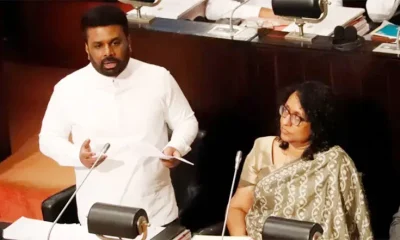
 Midweek Review7 days ago
Midweek Review7 days agoYear ends with the NPP govt. on the back foot
-
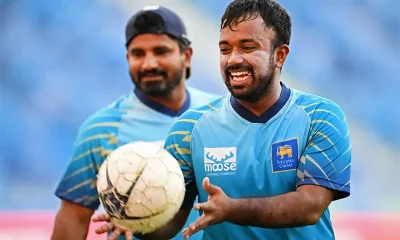
 Sports7 days ago
Sports7 days agoLife after the armband for Asalanka


